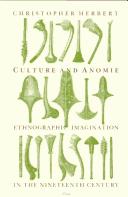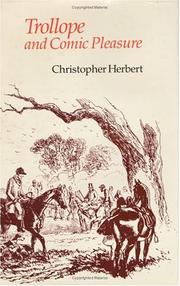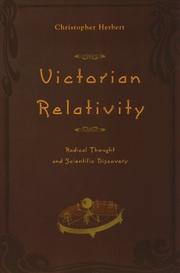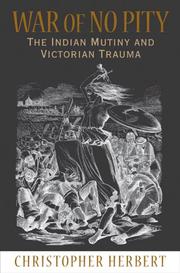| Listing 1 - 10 of 22 | << page >> |
Sort by
|

ISBN: 0226327396 Year: 1991 Publisher: Chicago (Ill.) University of Chicago press
Abstract | Keywords | Export | Availability | Bookmark
 Loading...
Loading...Choose an application
- Reference Manager
- EndNote
- RefWorks (Direct export to RefWorks)
History of civilization --- Ethnology. Cultural anthropology --- anno 1800-1899 --- Culture. --- Ethnology --- History. --- Culture --- Cultural sociology --- Sociology of culture --- Civilization --- Popular culture --- History --- Social aspects

ISBN: 0226327418 9780226327419 Year: 1987 Publisher: Chicago London University of Chicago Press
Abstract | Keywords | Export | Availability | Bookmark
 Loading...
Loading...Choose an application
- Reference Manager
- EndNote
- RefWorks (Direct export to RefWorks)
Comic, The, in literature --- Trollope, Anthony, --- Trollop, Antonio, --- Trollop, Antoni, --- Criticism and interpretation. --- Humor. --- Trollope (Anthony). Humour. --- Trollope (Anthony). Humor. --- Trollope, Anthony

ISBN: 0226327337 0226327329 9780226327327 Year: 2001 Publisher: Chicago University of Chicago press
Abstract | Keywords | Export | Availability | Bookmark
 Loading...
Loading...Choose an application
- Reference Manager
- EndNote
- RefWorks (Direct export to RefWorks)
One of the articles of faith of twentieth-century intellectual history is that the theory of relativity in physics sprang in its essentials from the unaided genius of Albert Einstein; another is that scientific relativity is unconnected to ethical, cultural, or epistemological relativisms. Victorian Relativity challenges these assumptions, unearthing a forgotten tradition of avant-garde speculation that took as its guiding principle ""the negation of the absolute"" and set itself under the militant banner of ""relativity.""Christopher Herbert shows that the idea of relativi
Knowledge, Theory of --- Relativity --- History --- Knowledge, Theory of - History - 19th century. --- Relativity - History - 19th century. --- Philosophy --- Philosophy & Religion --- Speculative Philosophy --- Relativism --- Reality --- Relationism

ISBN: 9780691143309 9780691133324 Year: 2008 Publisher: Princeton Princeton university press
Abstract | Keywords | Export | Availability | Bookmark
 Loading...
Loading...Choose an application
- Reference Manager
- EndNote
- RefWorks (Direct export to RefWorks)
English literature --- Literature and history --- Polemics in literature --- Politics and literature --- History and criticism --- History --- India --- Indland --- Ḣindiston Respublikasi --- Republic of India --- Bhārata --- Indii︠a︡ --- Inde --- Indië --- Indien --- Sāthāranarat ʻIndīa --- Yin-tu --- Bharat --- Government of India --- インド --- Indo --- Historiography. --- Literature and the rebellion. --- Public opinion. --- In literature. --- هند --- Индия
Book
ISBN: 9781138687448 1138687448 Year: 2017 Publisher: London Routledge
Abstract | Keywords | Export | Availability | Bookmark
 Loading...
Loading...Choose an application
- Reference Manager
- EndNote
- RefWorks (Direct export to RefWorks)
Art and religion --- Art and society --- Art, Netherlandish --- Reformation and art --- 27 <493> "13/14" --- 27 <491.9> "14" --- Art and the Reformation --- Christian art and symbolism --- Art --- Art and sociology --- Society and art --- Sociology and art --- Arts in the church --- Religion and art --- Religion --- Netherlandish art --- 27 <491.9> "14" Histoire de l'Eglise--De Nederlanden. Benelux--?"14" --- 27 <491.9> "14" Kerkgeschiedenis--De Nederlanden. Benelux--?"14" --- Histoire de l'Eglise--De Nederlanden. Benelux--?"14" --- Kerkgeschiedenis--De Nederlanden. Benelux--?"14" --- 27 <493> "13/14" Histoire de l'Eglise--België--?"13/14" --- 27 <493> "13/14" Kerkgeschiedenis--België--?"13/14" --- Histoire de l'Eglise--België--?"13/14" --- Kerkgeschiedenis--België--?"13/14" --- History --- Themes, motives --- Social aspects --- Religious aspects --- Iconography --- History of the Low Countries --- iconography --- Reformation --- anno 1400-1499
Book
ISBN: 0813943418 9780813943411 9780813943404 081394340X Year: 2019 Publisher: Charlottesville
Abstract | Keywords | Export | Availability | Bookmark
 Loading...
Loading...Choose an application
- Reference Manager
- EndNote
- RefWorks (Direct export to RefWorks)
"Examining both the theology of John Wesley, George Whitefield, and William Wilberforce and novels by Charles Dickens, George Eliot, Sir Walter Scott, and Bram Stoker as well as a host of 'Evangelical novels' of the period, Herbert analyzes the Evangelical and anti-Evangelical forces at play in Victorian literature and culture, challenging accepted notions of the impact of the Evangelical movement on gothic Victorian literature. "--
Religion and literature --- Religion in literature. --- Religious literature, English --- Evangelicalism in literature. --- English fiction --- Religion in drama --- Religion in poetry --- Literature --- Literature and religion --- History --- History and criticism. --- Moral and religious aspects
Book
ISBN: 0295744146 Year: 2018 Publisher: Seattle, Washington : University of Washington Press,
Abstract | Keywords | Export | Availability | Bookmark
 Loading...
Loading...Choose an application
- Reference Manager
- EndNote
- RefWorks (Direct export to RefWorks)
"The mid-nineteenth-century gold rushes bring to mind raucous mining camps and slapped-together cities populated by carousing miners, gamblers, and prostitutes. And yet many of the white men who went to the gold fields were products of the Victorian era: the same people popularly remembered as strait-laced, repressed, and order-loving. How do we make sense of this difference? Examining the closely linked gold rushes in California and British Columbia, historian Christopher Herbert shows that gold rushers worried about the meaning of white manhood in the near-anarchic, ethnically mixed societies that grew up around the mines. Their anxieties about reproducing the white male dominance they were accustomed to played a central role in the construction of colonial regimes. As white gold rushers flocked to the mines, they encountered a wide range of people they considered inferior and potentially dangerous to white dominance, including Indigenous people, Latin Americans, Australians, and Chinese. The way that white miners interacted with these groups reflected the distinct political principles and strategies of the US and British colonial governments, as well as the ideas about race and respectability the newcomers brought with them. In addition to renovating traditional understandings of the Pacific Slope gold rushes, Herbert argues that historians' understanding of white manliness has been too fixated on the Eastern United States and Britain. In the nineteenth century, popular attention largely focused on the West, and it was in the gold fields and the cities they spawned that new ideas of white manliness emerged, prefiguring transformations elsewhere."--Provided by publisher.
White people --- Gold mines and mining --- Race identity. --- California --- British Columbia --- Gold discoveries --- Social aspects.

ISBN: 1282901931 9786612901935 0226327361 9780226327365 0226327337 9780226327334 0226327329 9780226327327 0226327329 9780226327327 0226327337 9780226327334 Year: 2001 Publisher: Chicago University of Chicago Press
Abstract | Keywords | Export | Availability | Bookmark
 Loading...
Loading...Choose an application
- Reference Manager
- EndNote
- RefWorks (Direct export to RefWorks)
One of the articles of faith of twentieth-century intellectual history is that the theory of relativity in physics sprang in its essentials from the unaided genius of Albert Einstein; another is that scientific relativity is unconnected to ethical, cultural, or epistemological relativisms. Victorian Relativity challenges these assumptions, unearthing a forgotten tradition of avant-garde speculation that took as its guiding principle "the negation of the absolute" and set itself under the militant banner of "relativity." Christopher Herbert shows that the idea of relativity produced revolutionary changes in one field after another in the nineteenth century. Surveying a long line of thinkers including Herbert Spencer, Charles Darwin, Alexander Bain, W. K. Clifford, W. S. Jevons, Karl Pearson, James Frazer, and Einstein himself, Victorian Relativity argues that the early relativity movement was bound closely to motives of political and cultural reform and, in particular, to radical critiques of the ideology of authoritarianism. Recuperating relativity from those who treat it as synonymous with nihilism, Herbert portrays it as the basis of some of our crucial intellectual and ethical traditions.
Relativity --- Knowledge, Theory of --- History --- relativity, relativism, victorian, science, religion, faith, truth, authority, objectivity, negation, absolutes, reform, authoritarianism, einstein, james frazer, karl pearson, ws jevons, wk clifford, alexander bain, charles darwin, herbert spencer, knowledge, ideology, logic, proliferation, difference, unity, social change, nonfiction, philosophy, politics, history.
Book
ISBN: 9781400832767 Year: 2021 Publisher: Princeton, NJ
Abstract | Keywords | Export | Availability | Bookmark
 Loading...
Loading...Choose an application
- Reference Manager
- EndNote
- RefWorks (Direct export to RefWorks)
Digital
ISBN: 9781400832767 Year: 2021 Publisher: Princeton, N.J. Princeton University Press
Abstract | Keywords | Export | Availability | Bookmark
 Loading...
Loading...Choose an application
- Reference Manager
- EndNote
- RefWorks (Direct export to RefWorks)
| Listing 1 - 10 of 22 | << page >> |
Sort by
|

 Search
Search Feedback
Feedback About UniCat
About UniCat  Help
Help News
News